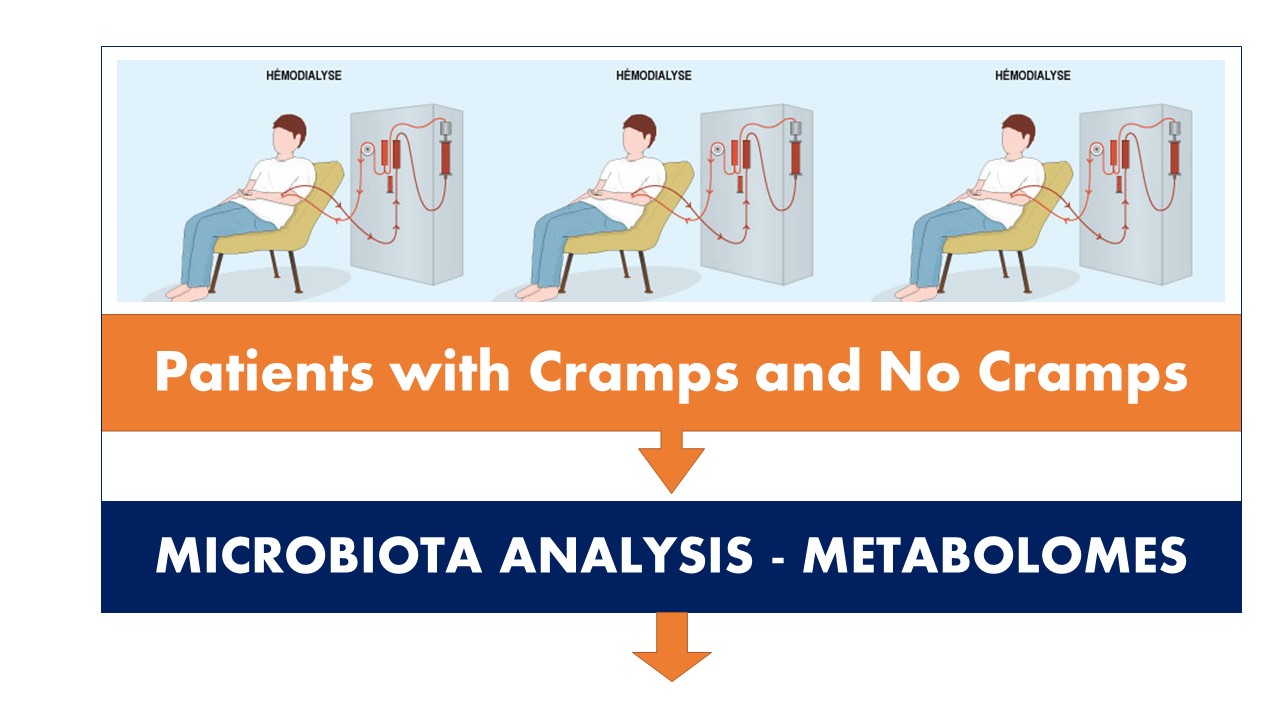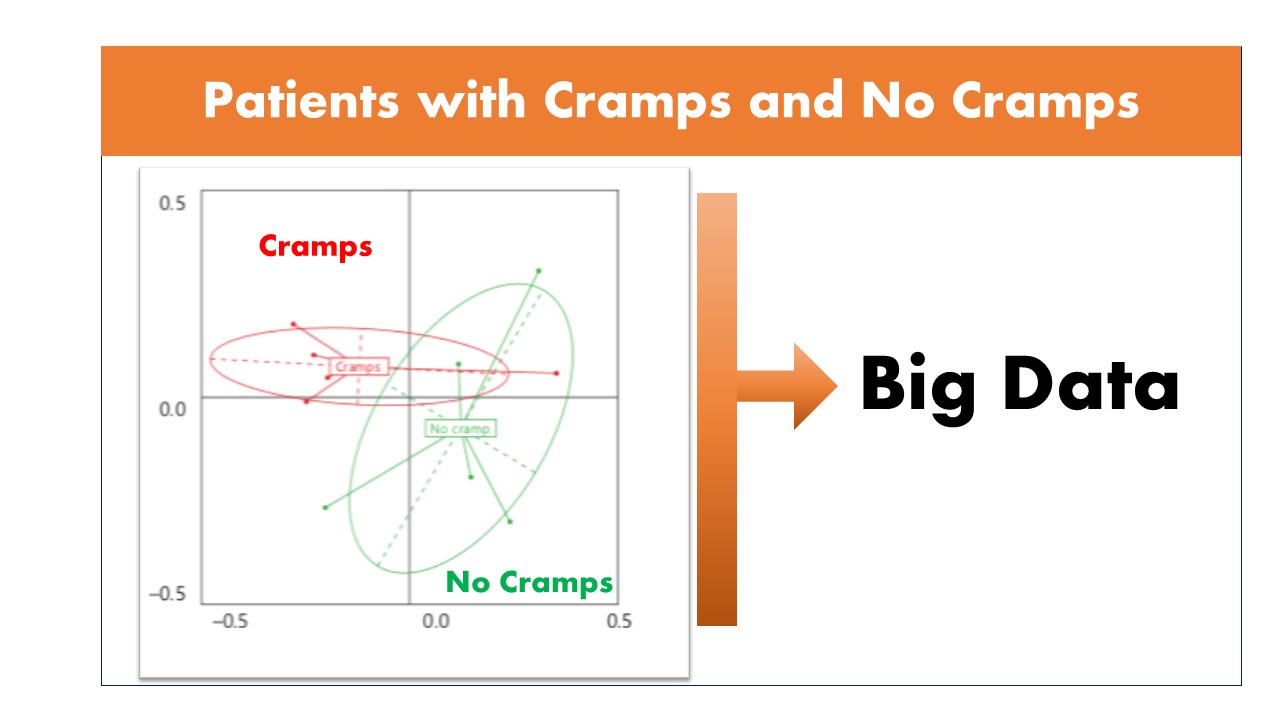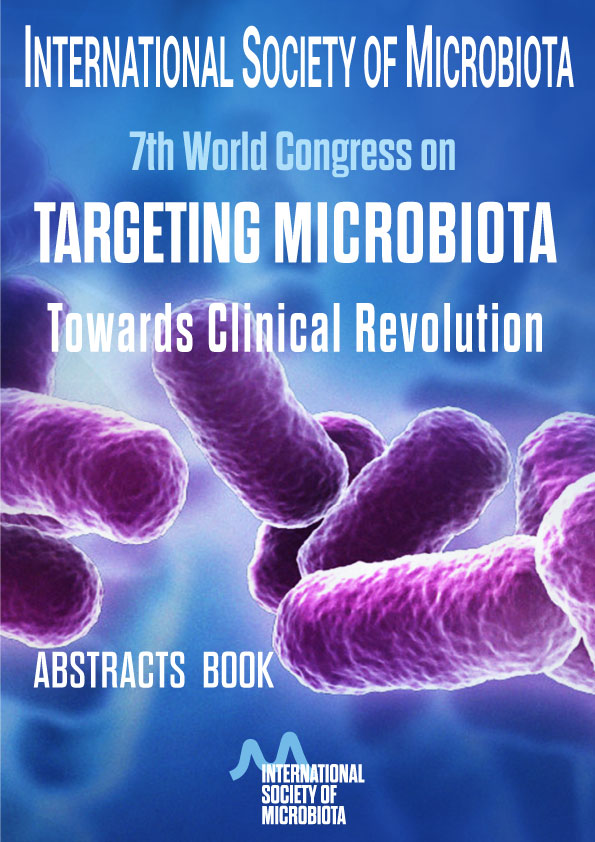Alerts
A New Blood Component Revealed
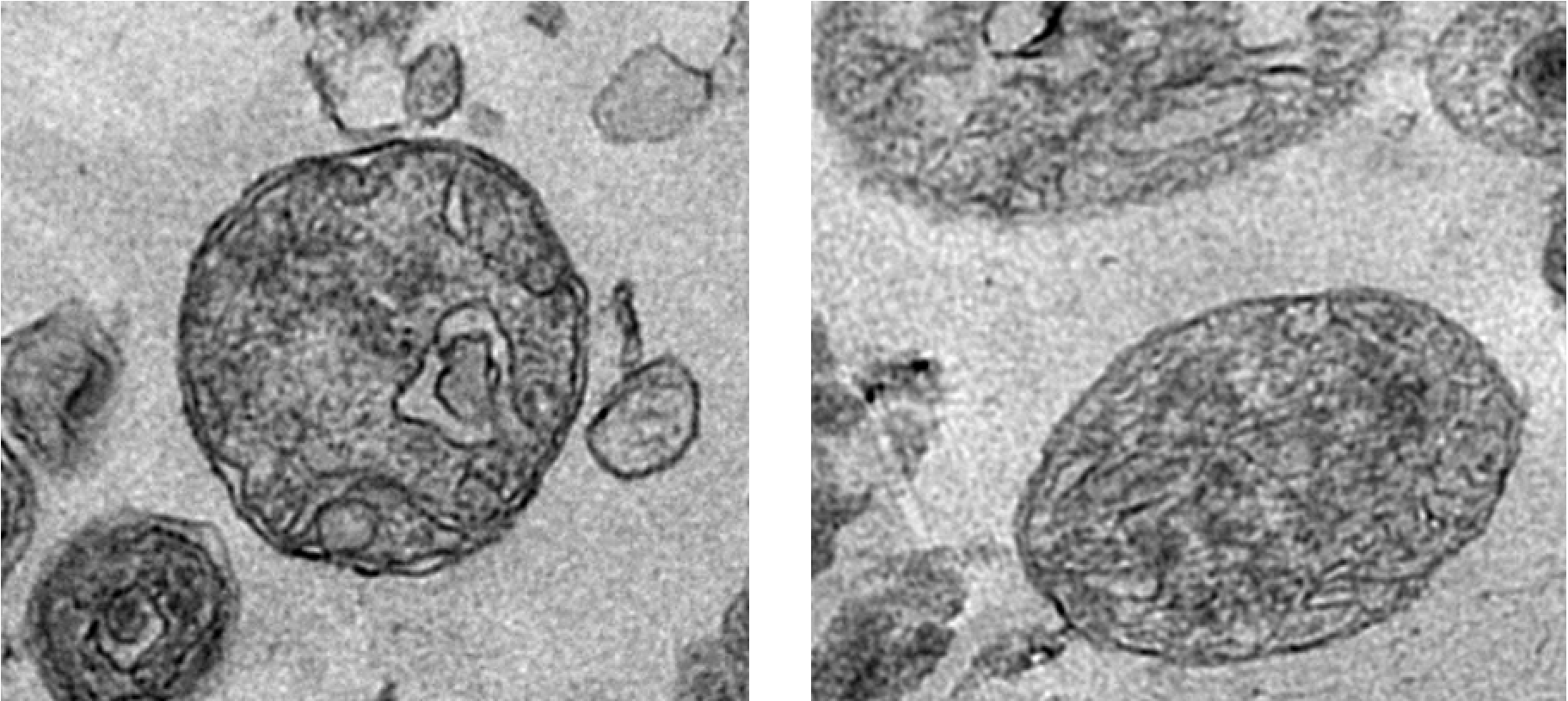
Functional extracellular mitochondria revealed in the blood circulation. ©Alain R. Thierry/Inserm
Does the blood we thought to know so well contain elements that had been undetectable until now? The answer is yes, according to a team of researchers from Inserm, Université de Montpellier and the Montpellier Cancer Institute (ICM) working at the Montpellier Cancer Research Institute (IRCM), which has revealed the presence of whole functional mitochondria in the blood circulation. These organelles that are responsible for cellular respiration had hitherto only been found outside cells in very specific cases. The team’s findings, published in The FASEB Journal, will deepen our knowledge of physiology and open up new avenues for treatment.
Mitochondria are organelles that are found in the eukaryotic cells. A place of cellular respiration, they are the cells’ “batteries” and play a major role in energy metabolism and intercellular communication. Their particularity is to possess their own genome, transmitted solely by the mother and separate from the DNA contained in the nucleus. The mitochondria can sometimes be observed outside the cells in the form of fragments encapsulated within microvesicles. Under certain very specific conditions the platelets are also capable of releasing intact mitochondria into the extracellular space.
The work of a team led by Inserm researcher Alain R. Thierry at the Montpellier Cancer Research Institute (Inserm/Université de Montpellier/Montpellier Cancer Institute) has now revolutionized knowledge of this organelle by revealing that whole functioning extracellular mitochondria are in fact found in the bloodstream!
The researchers used previous findings which showed that the plasma of a healthy individual contains up to 50,000 times more mitochondrial DNA than nuclear DNA. They hypothesized that for it to be detectable and quantifiable in the blood in this manner, the mitochondrial DNA had to be protected by a structure of sufficient stability. In order to identify such a structure, plasma samples from around 100 individuals were analyzed.
This analysis revealed the presence in the blood circulation of highly stable structures containing whole mitochondrial genomes. Following examination of their size and density, as well as the integrity of their mitochondrial DNA, these structures observed using electron microscopy (up to 3.7 million per ml of plasma) were revealed to be intact and functional mitochondria.
Throughout the seven-year research period, the scientists used as many technical and methodological approaches as possible to validate this presence of circulating extracellular mitochondria in the blood.
“When we consider the sheer number of extracellular mitochondria found in the blood, we have to ask why such a discovery had not been made before, notes Thierry. Our team has built up expertise in the specific and sensitive detection of DNA in the blood, by working on the fragmentation of extracellular DNA derived from the mitochondria in particular”, he adds.
But what is the role of these extracellular mitochondria? The answer to that could be linked to the structure of the mitochondrial DNA, similar to that of bacterial DNA, which gives it the ability to induce immune and inflammatory responses. Based on this observation, the researchers hypothesize that these circulating mitochondria could be implicated in many physiological and/or pathological processes requiring communication between the cells (such as the mechanisms of inflammation). Indeed, recent studies have demonstrated the ability of certain cells to transfer mitochondria between themselves, such as the stem cells with damaged cells. “The extracellular mitochondria could perform various tasks as messenger for the entire body”, specifies Thierry.
In addition to its importance to our knowledge of physiology, this discovery could lead to improvements in the diagnosis, monitoring and treatment of certain diseases. In fact, the research team is now devoting its attention to evaluating the extracellular mitochondria as biomarkers in non-invasive prenatal diagnosis and cancer.
Inserm press room A New Blood Component Revealed
Link : https://presse.inserm.fr/en/a-new-blood-component-revealed/37905/
Phage infection mediates inhibition of bystander bacteria
Bacteriophages (phages) are being considered as alternative therapeutics for the treatment of multidrug resistant bacterial infections. Considering phages have narrow host-ranges, it is generally accepted that therapeutic phages will have a marginal impact on non-target bacteria. We have discovered that lytic phage infection induces transcription of type VIIb secretion system (T7SS) genes in the pathobiont Enterococcus faecalis. Membrane damage during phage infection induces T7SS gene expression resulting in cell contact dependent antagonism of diverse Gram positive bystander bacteria. Deletion of essB, a T7SS structural component abrogates phage-mediated killing of bystanders. A predicted immunity gene confers protection against T7SS mediated inhibition and disruption of an upstream LXG toxin gene rescues growth of E. faecalis and Staphylococcus aureus bystanders. Phage induction of T7SS gene expression and bystander inhibition requires IreK, a serine/threonine kinase, and OG1RF_11099, a predicted transcriptional activator. Our findings highlight how phage infection of a target bacterium can affect non-target bystander bacteria and implies phage therapy could impose collateral damage to polymicrobial communities.
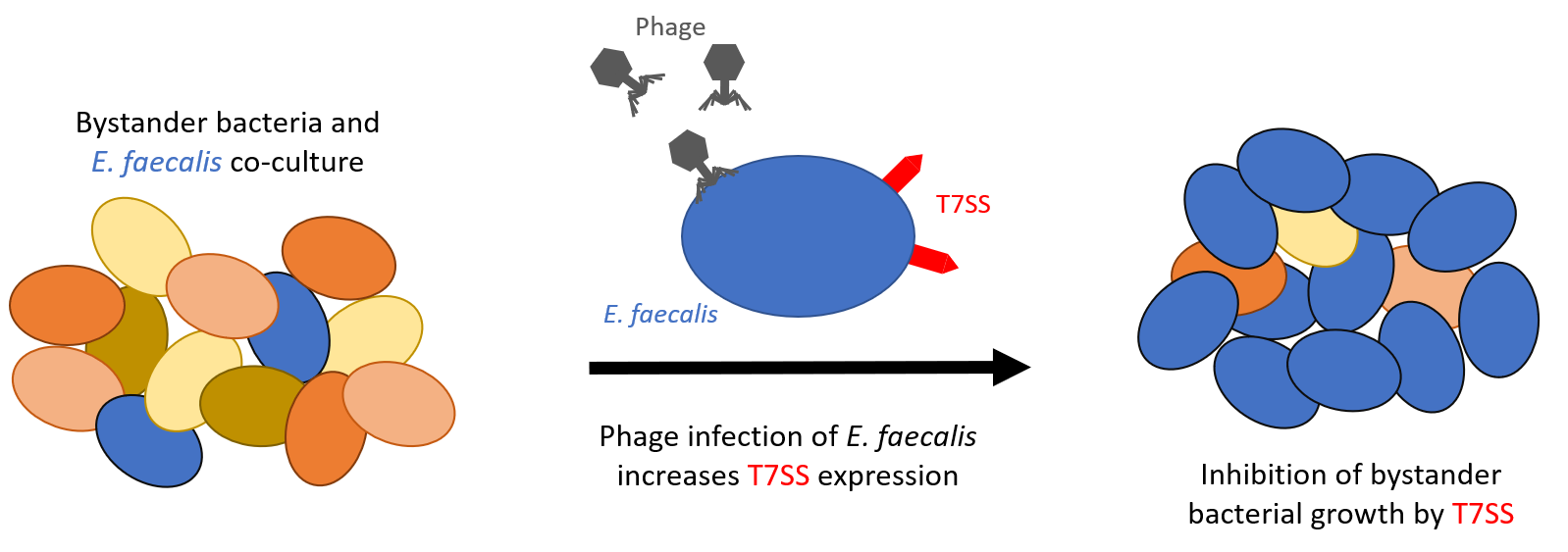
Image source: prelights.biologists.com
News Source: www.biorxiv.org
At your Agenda:
8th World Congress on Targeting Microbiota
October 22-23, 2020 - UNESCO, Paris, France
www.microbiota-site.com
Lung Microbiota Predict Clinical Outcomes in Critically Ill Patients
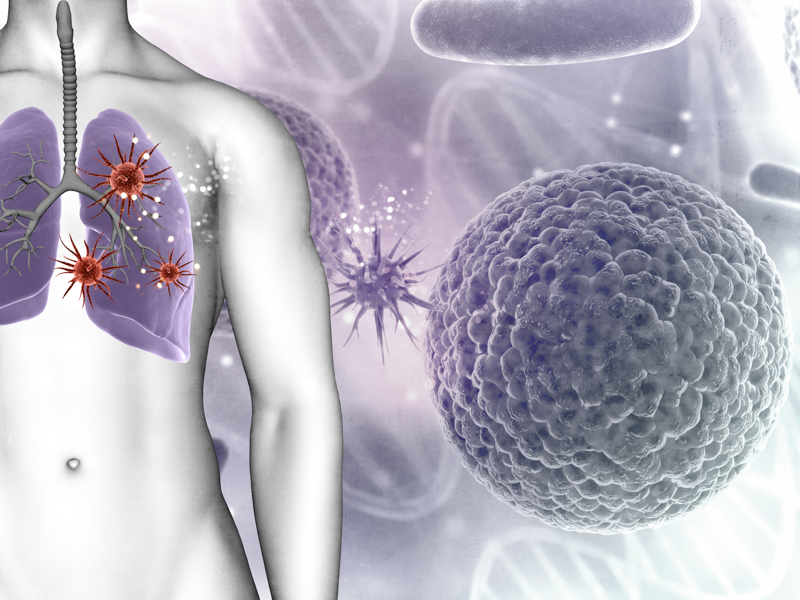
Rationale: Recent studies have revealed that in critically ill patients, lung microbiota are altered and correlate with alveolar inflammation. The clinical significance of altered lung bacteria in critical illness is unknown. Objectives: To determine if clinical outcomes of critically ill patients are predicted by features of the lung microbiome at the time of admission. Methods: We performed a prospective observational cohort study in an intensive care unit (ICU) at a university hospital. Lung microbiota were quantified and characterized using droplet digital PCR and bacterial 16S rRNA gene sequencing. Primary predictors were the bacterial burden, community diversity, and community composition of lung microbiota. The primary outcome was ventilator-free days, determined at 28 days post admission. Measurements and Main Results: Lungs of 91 critically ill patients were sampled using miniature-bronchoalveolar lavage within 24 hours of ICU admission. Patients with increased bacterial lung bacterial burden had fewer ventilator-free days (HR 0.43, CI 0.21-0.88), which remained significant when controlled for pneumonia and severity of illness. The community composition of lung bacteria predicted ventilator-free days (P=0.003), driven by the presence of gut-associated bacteria (e.g. Lachnospiraceae and Enterobacteriaceae spp.). Detection of gut-associated bacteria was also associated with the presence of the acute respiratory distress syndrome. Conclusions: Key features of the lung microbiome (bacterial burden, enrichment with gut-associated bacteria) predict outcomes in critically ill patients. The lung microbiome is an understudied source of clinical variation in critical illness, and represents a novel therapeutic target for the prevention and treatment of acute respiratory failure.
Authors: Robert P. Dickson , Marcus J. Schultz , Tom van der Poll , Laura R. Schouten , Nicole R. Falkowski , Jenna E Luth , Michael W. Sjoding , Christopher A Brown , Rishi Chanderraj , Gary B. Huffnagle , Lieuwe D.J. Bos
Patients with ankylosing spondylitis display distinct fecal microbiota signature
 Patients with ankylosing spondylitis demonstrate a distinct fecal microbiota signature that is linked to levels of fecal calprotectin, but not other clinical parameters, according to data published in Arthritis Research & Therapy.
Patients with ankylosing spondylitis demonstrate a distinct fecal microbiota signature that is linked to levels of fecal calprotectin, but not other clinical parameters, according to data published in Arthritis Research & Therapy.
“The gastrointestinal tract is the home of more than 1,000 species of bacteria, but also fungi and viruses, which coexist with the host in a reciprocal relationship,” Eva Klingberg, MD,PhD, of the Sahlgrenska Academy at the University of Gothenburg, in Sweden, and colleagues wrote. “The gut microbiota is necessary for the development and shaping of the immune system, and the host genetics play a role in the establishing and shaping of the gut microbiota.”
“Intestinal microbiota most likely play a role in initiating and triggering the immune system in individuals who are genetically susceptible for [inflammatory bowel disease], leading to the typical gut inflammation of [Crohn’s disease] and [ulcerative colitis],” they added. “Aberrations in the gut microbiome, dysbiosis with decreased bacterial diversity, expansion of potentially pro-inflammatory bacteria, and reduction of potentially anti-inflammatory, protective bacteria have repeatedly been shown in IBD. However, it is still unclear whether the dysbiosis in IBD is a cause or a consequence of the gut inflammation.”
To evaluate differences in fecal microbiota among patients with AS, ulcerative colitis and healthy individuals, as well as analyze the relationship between fecal microbiota, fecal calprotectin and disease-related variables in AS, Klingberg and colleagues studied a cohort from Western Sweden across the 5-year period. Participants included 204 patients recruited in 2009, with the same patients invited back for a follow-up in 2014. For this analysis, the researchers focused on 150 participants with AS, 18 with ulcerative colitis and 17 healthy controls with no history of gastrointestinal or other chronic disorders.
Klingberg E, et al. Arthritis Res Ther. 2019;doi:10.1186/s13075-019-2018-4.
News source: https://www.healio.com/
The Poster Contribution Award was discerned to Dr. Agata Chudzik
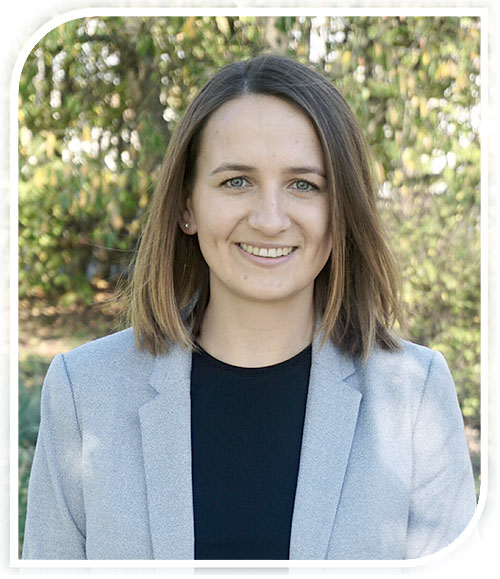 The Poster Contribution Award was discerned to Dr. Agata Chudzik from Medical University of Lublin, Poland, during Targeting Microbiota 2019, which was held in Krakow, Poland, for her poster presentation entitled "Evaluation of neurometabolites level after microbiotic supplementation (Lactobacillus rhumnosus LR-JB1TM) in rat model of chronic unpredictable mild stress".
The Poster Contribution Award was discerned to Dr. Agata Chudzik from Medical University of Lublin, Poland, during Targeting Microbiota 2019, which was held in Krakow, Poland, for her poster presentation entitled "Evaluation of neurometabolites level after microbiotic supplementation (Lactobacillus rhumnosus LR-JB1TM) in rat model of chronic unpredictable mild stress".
The study assesses the neurometabolic and behavioral changes after bacterial diet in an animal model of chronic unpredictable mild stress. The results show that JB-1 bacteria diet influenced the stabilization of stress-related neurometabolites in rat brain and prevented to develop anxiety/depressive-like behavior.
Testimonial by Dr. Chudzik:
"It was a great pleasure to attend to Targeting Microbiota 2019 Congress. I would like to thank Organizers for the opportunity to present my PhD research and I feel very honoured that Scientific Committee awarded it.Participating in Targeting Microbiota Congress allowed me to hear and discuss the recent advances and challenges in the microbiota research. The outstanding lectures given by experts in the field of human and animal microbiome were very inspiring and enabled a new look at the topics discussed. I have enriched my knowledge about the microbiome-gut-brain axis in detail, which is a particularly exciting issue for me. Moreover congress allowed me to meet people interested in similar issues and every conversation led to brainstorming and sharing ideas."
Media center:
International Society of Microbiota
Contact: [email protected]
www.microbiota-site.com
The Short Oral Contribution Award was delivered to Dr. Satu Pekkala
 During the Targeting Microbiota 2019 congress, which was held in Krakow, Poland, the Scientific Committee awarded Dr. Satu Pekkala, from University of Jyvaskyla, Finland, for her Oral Presentation entitled "Targeting Faecalibacterium prausnitzii with prebiotic xylo oligosaccharides prevents from Non-Alcoholic Fatty Liver Disease (NAFLD)"
During the Targeting Microbiota 2019 congress, which was held in Krakow, Poland, the Scientific Committee awarded Dr. Satu Pekkala, from University of Jyvaskyla, Finland, for her Oral Presentation entitled "Targeting Faecalibacterium prausnitzii with prebiotic xylo oligosaccharides prevents from Non-Alcoholic Fatty Liver Disease (NAFLD)"
The study presented by Dr. Pekkala identifies F. prausnitzii as target treat NAFLD and the underlying preventive mechanisms that involve fat oxidation and glucose metabolism.
Testimonial by Dr. Pekkala:
" I am very honored for this award and I congratulate the International of Society of Microbiota by organizing the congress 7th Targeting Microbiota full of excellent presentations. I have always thought that the gut microbiota studies should advance from detecting associations to show mechanistically the biological significance of the detected associations. This is needed to be able to target the microbes to treat different diseases in the future. Therefore, I am thrilled to see the development of the gut microbiota studies from year to year in this congress!
I am currently Academy of Finland Research Fellow at the Faculty of Sport and Health Sciences, University of Jyväskylä, Finland. I am also Adjunct Professor at the Faculty of Medicine, University of Turku, Finland. My research team has discovered that a specific gut bacterium, Faecalibacterium prausnitzii associated with liver fat content in humans. We treated a murine model of fatty liver with this bacterium and found that it was able to prevent the disease. Unfortunately, the potential therapeutic microbes are not always accepted for human use and therefore it is important to find alternative ways to increase their natural abundance in the gut. As I presented in the congress, we found a prebiotic fibre that increased F. prausnitzii in vivo and at the same could prevent fatty liver in rats. We are currently setting up a human study to see whether our findings can be translated to humans."
Media center:
International Society of Microbiota
Contact: [email protected]
www.microbiota-site.com
Prof. Chantal Pichon, French National Centre for Scientific Research, France, awarded by International Society of Microbiota
International Society of Microbiota (ISM) is honored to announce the winner of the Scientific Contribution Award for the year 2019, Prof. Chantal Pichon from French National Centre for Scientific Research, University of Orléans, France.
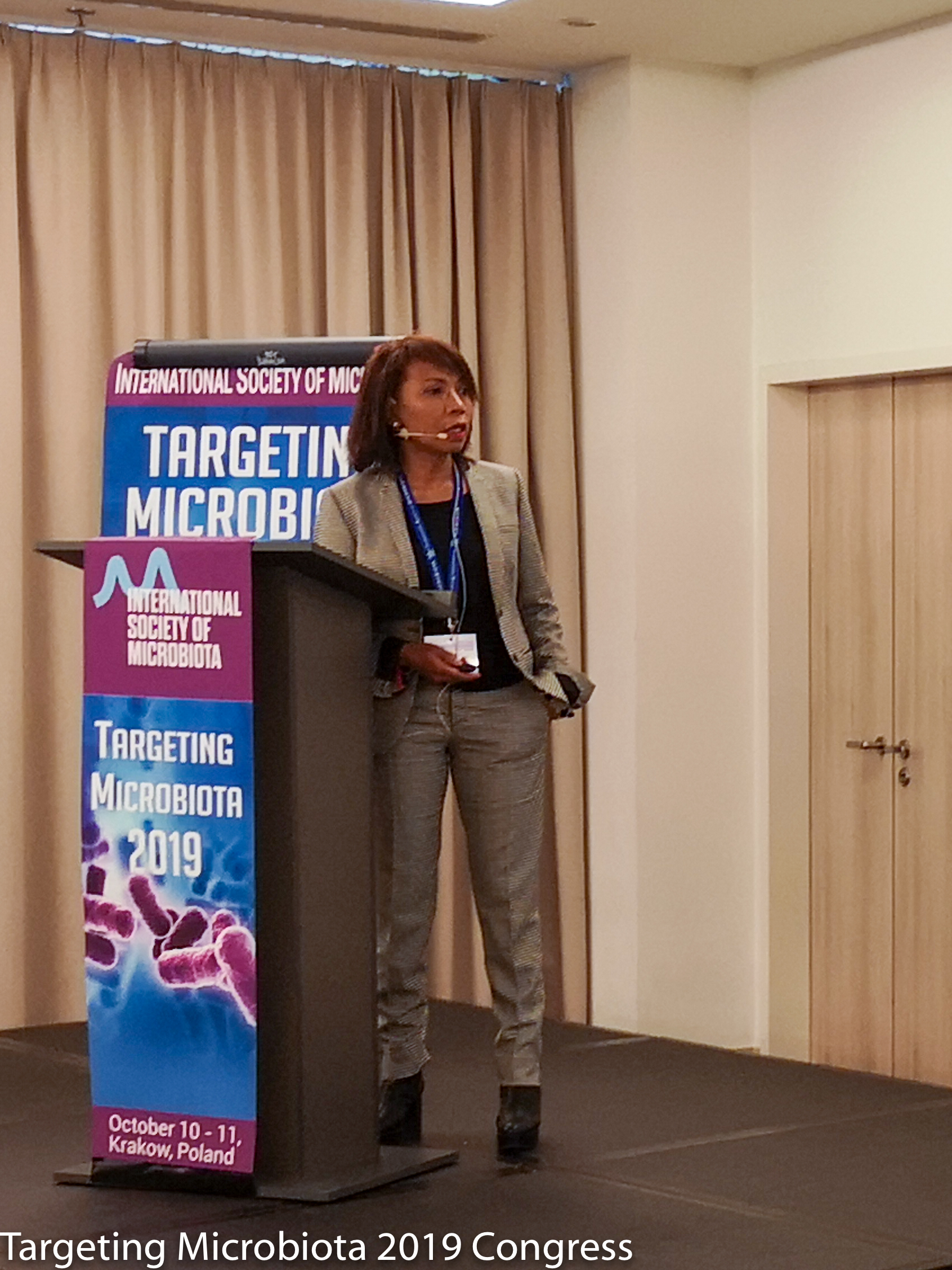
Prof. Chantal Pichon gave an excellent communication during the 7th World Congress on Targeting Microbiota 2019, which was held in Krakow, Poland, on the Dialogue between the skin and the microbiota: The immune system is under control.
Testimonial of Prof. Pichon:
"I am indebted to the organizers for inviting me to speak at Targeting Microbiota and giving me the award. It was an inspiring and very high level conference. Cutting Edge research projects have been presented indicating how fast is growing the knowledge in the field and how we could together tackle the challenges on developing novel therapies based on microbiota interaction with our body."
Oral presentation of Prof. Chantal Pichon during Targeting Microbiota 2019:
The skin, the largest organ of our body is also the outermost barrier of the organism. It protects from external harm and senses danger signals. It contains a sophisticated immune system that involves armada of immune cells comprising keratinocytes, resident antigen-presenting cell, innate lymphoid cells, innate-like cells, and adaptive tissue-resident memory cells and molecular mediators. The skin hosts also microbial communities recognized as skin microbiota that constitutes one living response barrier to environmental factors. Those microorganisms live in complete harmony with the immune players and are involved in the epithelial barrier reinforcement. Under homeostasis, an established alliance of immunity and microbiota intermingles innate and adaptive branches of the immune system. Under various types of stress, the symbiotic relationship changes into a dysbiotic one resulting in skin disorders. The talk will be focused on the cutaneous immune system from cellular to molecular actors and how skin microbiota can acts to limit pathogenic microbial invasion and to promote various aspects of immune responses.
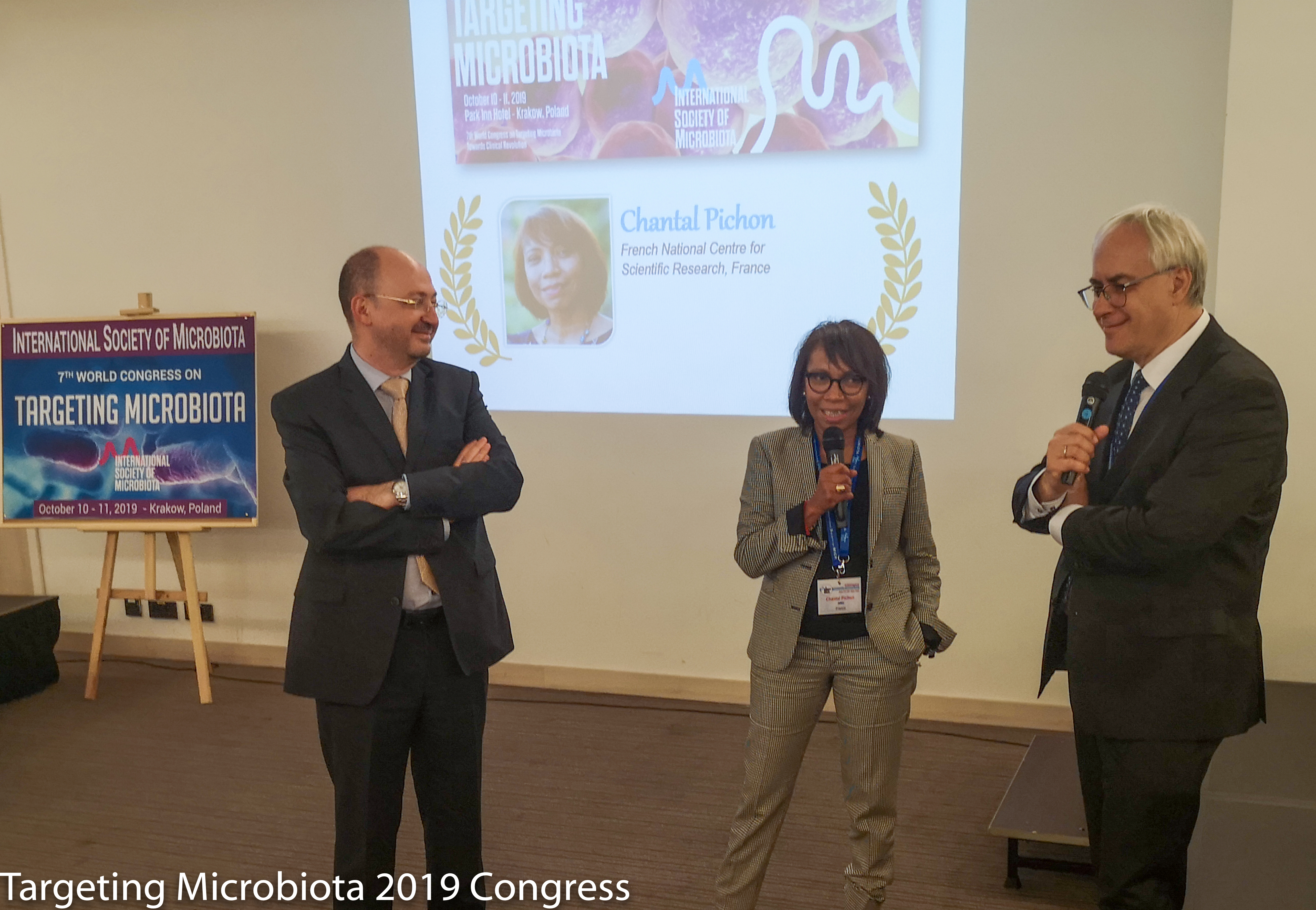
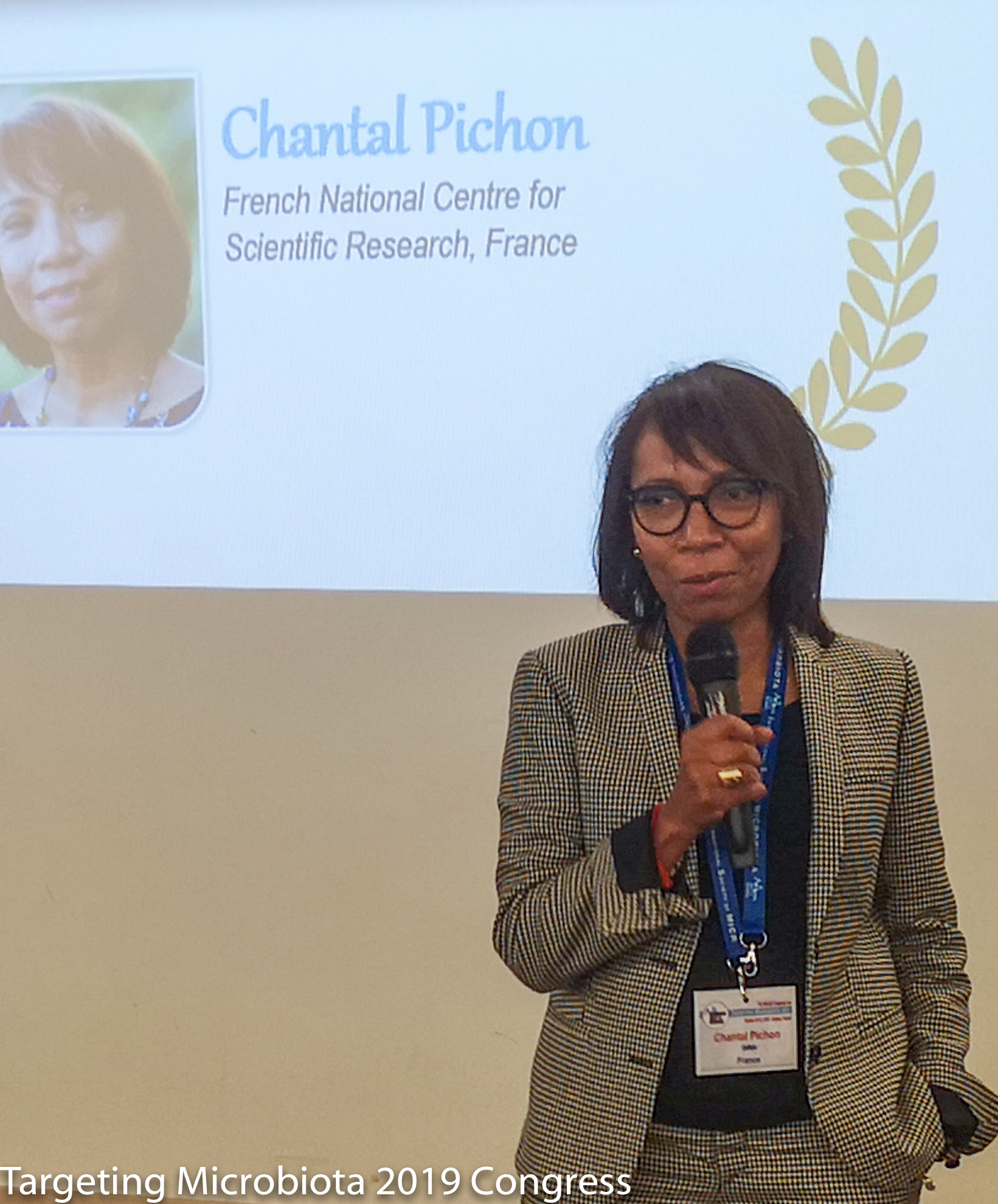
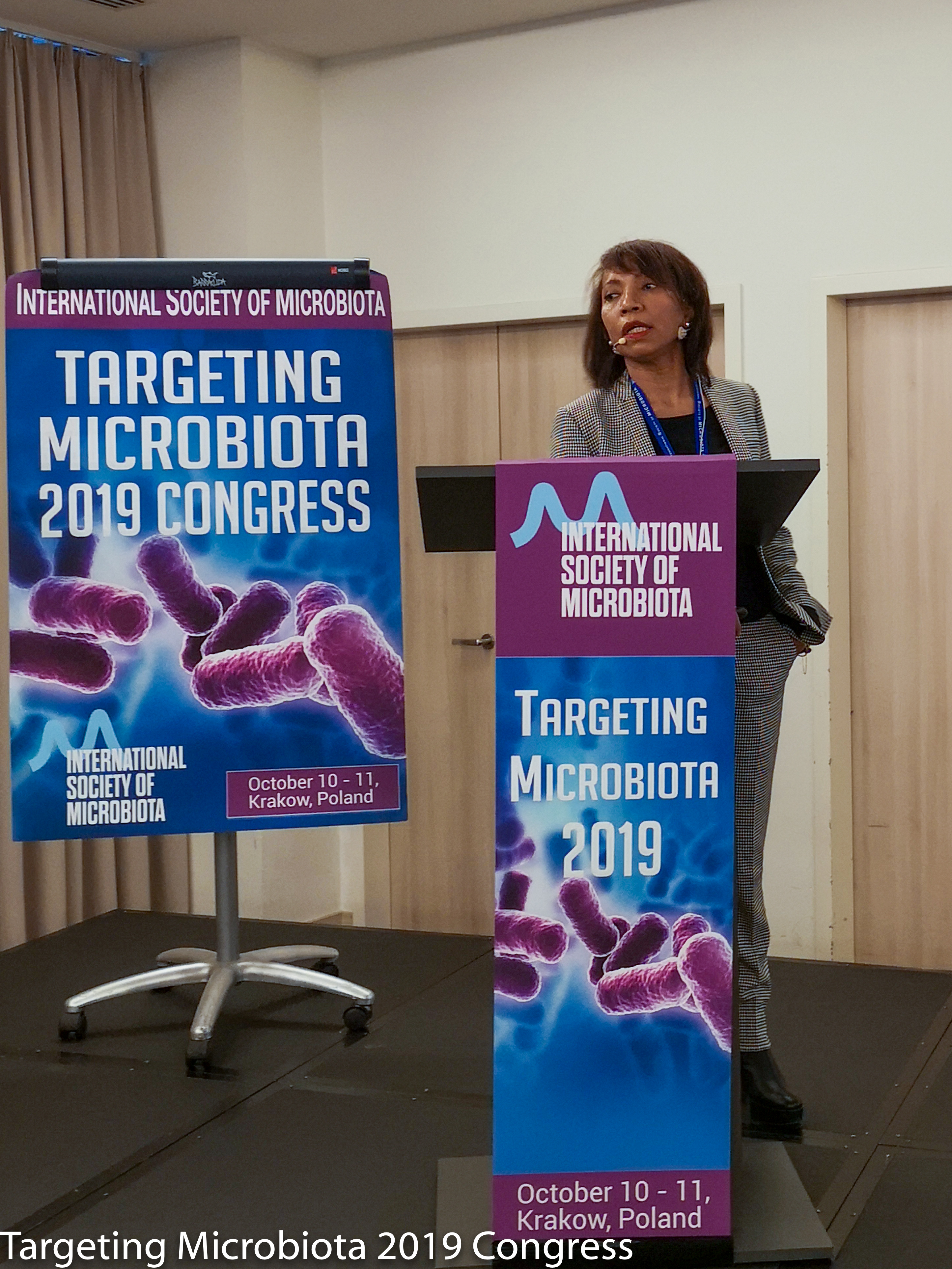
For media information:
International Society of Microbiota
Media center:
Contact: [email protected]
www.microbiota-site.com
Development and Investment Landscape in the Microbiome
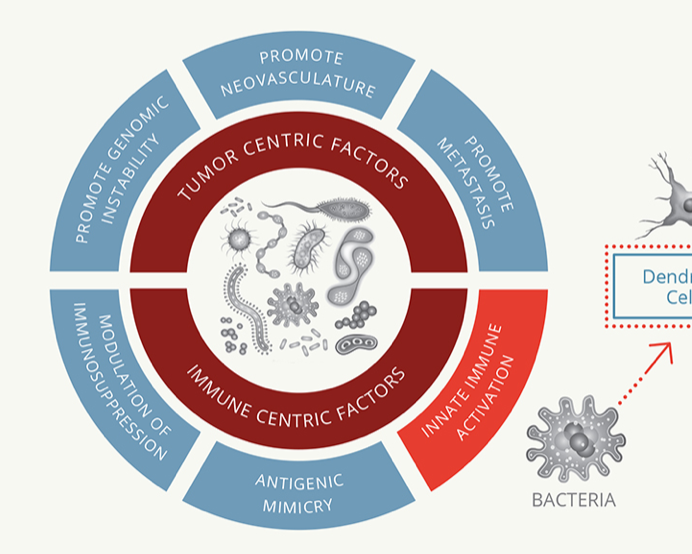 During the congress, Dr. Peter Bak, Back Bay Life Science Advisors, USA will provide his vision and recommendations.
During the congress, Dr. Peter Bak, Back Bay Life Science Advisors, USA will provide his vision and recommendations.
The title of his presentation is 'Corporate Development in the Microbe Space: Has Investment Outpaced Science?'
1) Microbiome Company Landscape
2) Current State of Clinical Development
3) Investment and Corporate Considerations
Prof. Marvin Edeas and his team presented a study on Intelligence Artificial and Health meeting at University Paris-Sud
The Intelligence Artificial and Health meeting was held on November 25, 2019, at University Paris-Sud. During the meeting, Prof. Marvin Edeas from INSERM - U1016, Institut Cochin, Hôpital Cochin, University Paris Descartes with his team presented a study entitled "Artificial Intelligence in the Healthcare Industry: The Hemodialysis patients with cramps initiative".
Introduction
Artificial intelligence in the healthcare industry will open a huge opportunity. Demand for basic and advanced analytics is growing exponentially in healthcare. We are beginning to enter into an era where life sciences and data science are merging. Our initiative will collect clinical data from hemodialysis patients, which will urgently need a Data Scientists to process it. To be able to analyze and make recommendations based on this data, we need AI.
Methods
For the first time we published in 2018 a possible link between Microbiota quality, mitochondrial activity and the occurrence of muscle cramps in hemodialysis patients using citrate dialysate. Our objectives were to assess the gut microbiota quality, mitochondrial activity, and to investigate their possible relationship with HD-associated muscle cramp (HDAMC). This clinical study revealed a possible dysbiosis of microbiota and mitochondrial dysfunction in HD patients with cramps under CD compared to patients without cramp.
Confirmation of our observations is required in a large-scale study, which could demonstrate a novel pathophysiological mechanism linking muscle cramps to gut microbiota HD patients. We now have a cohort of more than 1500 patients to complete our study.
Results Expected
We will use a combined microbiome and metabolome signatures in feces and metabolome in plasma as new biomarkers to identify in upstream the HD patients with altered metabolism in order to propose an adapted therapy. Advances in sequencing technologies could provide opportunities to understand not only the taxonomy but also the functional diversity of gut microbiota. These investigations could allow to justify the use of antibiotics, probiotics, prebiotics, or fecal microbiota transplantation to modulate gut microbiota as curatives or preventive strategies of muscle cramps. We will also look for a predictive marker of muscle cramps by initiating an Artificial Intelligence program.
Conclusion
There are significant hurdles to be overcome with our hemodialysis initiative: 1-finding talented data scientists. 2- regulatory aspects. This presentation will address these considerations.
Durand, P.-Y., Nicco, C., Serteyn, D., Attaf, D. & Edeas, M. Microbiota Quality and Mitochondrial Activity Link with Occurrence of Muscle Cramps in Hemodialysis Patients using Citrate Dialysate: A Pilot Study.
Blood Purif. 46, 301–308 (2018).
For more info, please check the agenda here: http://www.medecine.u-psud.fr/fr/recherche/colloque-intelligence-artificielle-et-sante.html
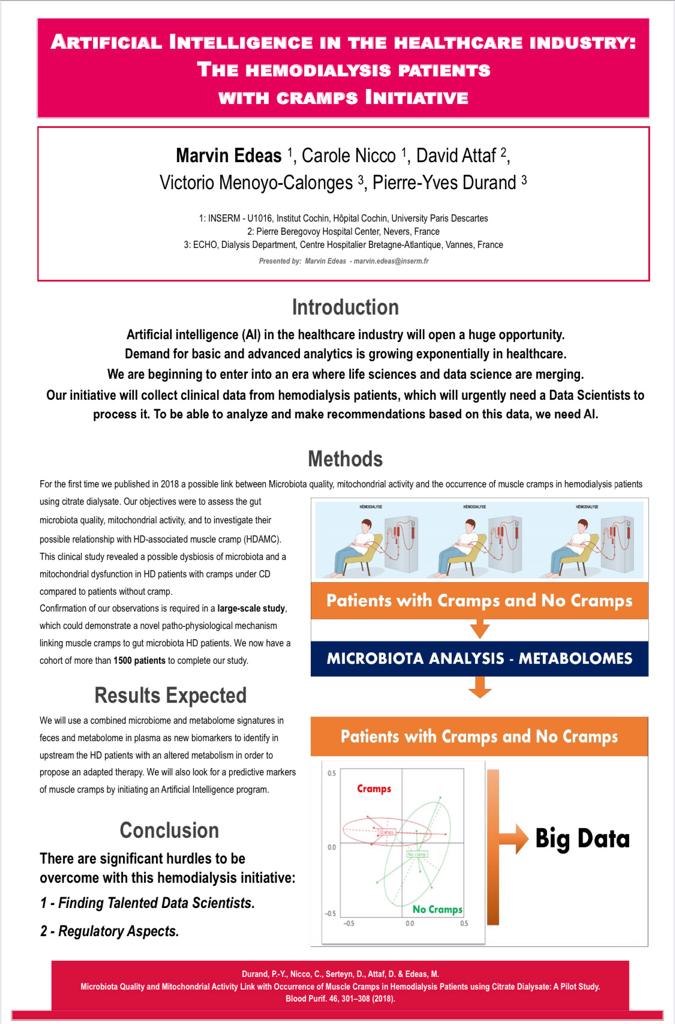
Prof. Peter Kuntorek and Prof. Marvin Edeas from the International Society of Microbiota will talk during the 9th Latvian Gastroenterology Congress
 Prof. Peter Konturek from Teaching Hospital of the University of Jena, Germany will talk about "Fecal microbiota transplantation as a powerful tool for modulating of gut".
Prof. Peter Konturek from Teaching Hospital of the University of Jena, Germany will talk about "Fecal microbiota transplantation as a powerful tool for modulating of gut".Final Agenda & Abstracts Book of Microbiota 2019 Congress
|
The Organizing Committee published the Final Agenda of Microbiota 2019 Congress. If you cannot take part in the conference, you can order this Abstracts Book in PDF Format by clicking here. |
The International Society of Microbiota is pleased to welcome Biocrates Life Sciences AG to the 7th Targeting Microbiota World Congress 2019 !

Biocrates Life Sciences AG, internationally renowned developer of targeted metabolic phenotyping solutions, supports the discovery and validation of biomarkers for complex multifactorial diseases in pre-clinical and clinical research.
Based in Innsbruck and with a subsidiary in the US, the company provides user friendly and ready to measure kits for quantitative, mass spectrometry based metabolite analysis.
Biocrates MxP Quant 500 Kit allows standardized measurement of up to 630 metabolites, many of which are associated with microbial metabolism (such as secondary bile acids).
This enables researchers to unravel the functional relationship between host, nutrition and the microbiome.
During the Congress, Dr. Nicolas Schauer from the company will give a presentation entitled "Application of targeted metabolomics to tackle host-microbiome interactions".
If you want to know more about the company, feel free to visit their website www.biocrates.com
DNA Genotek received the ISM Industrial Award during Targeting Microbiota 2019
International Society of Microbiota (ISM) is honored to announce DNA Genotek as one of three winners of the Industrial Innovation Awards, during the 7th World Congress on Targeting Microbiota 2019, which was held in Krakow, Poland.
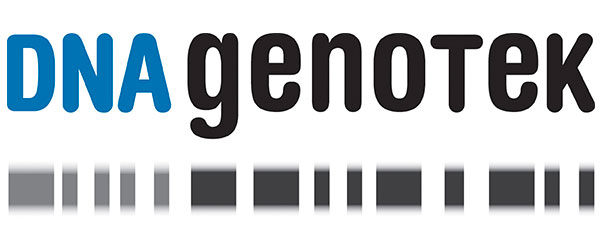
DNA Genotek is recognized as a leader worldwide in the production and development of standardized skin microbiome and fecal metabolomics collection methodologies.
Testimonial by Heloise Breton, from DNA Genotek:
"We would like to thank the scientific committee for awarding us the the industrial innovation award. As a company dedicated to developing products to optimize ease of collection and provide superior samples and proven performance, we are so happy to see our value in the industry recognized. This year’s Targeting Microbiota conference consisted of many great talks that captured the role of the microbiome in human and animal systems. The connection between the brain and the gut is a huge development and the work happening in this field will be life changing for neurological diseases such as Alzheimer’s. Skin microbiome is an upcoming topic and of high interest for us as we have been working on a collection device for skin sampling which will launch soon. This is a topic that has many applications as seen in the talks regarding cosmetics, immune function and cutaneous homeostasis. There is so much amazing research happening in Europe and we enjoy being a part of such an innovative scientific community. We hope to see the ISM grow every year and to continue to provide a platform for the future of microbiome research."
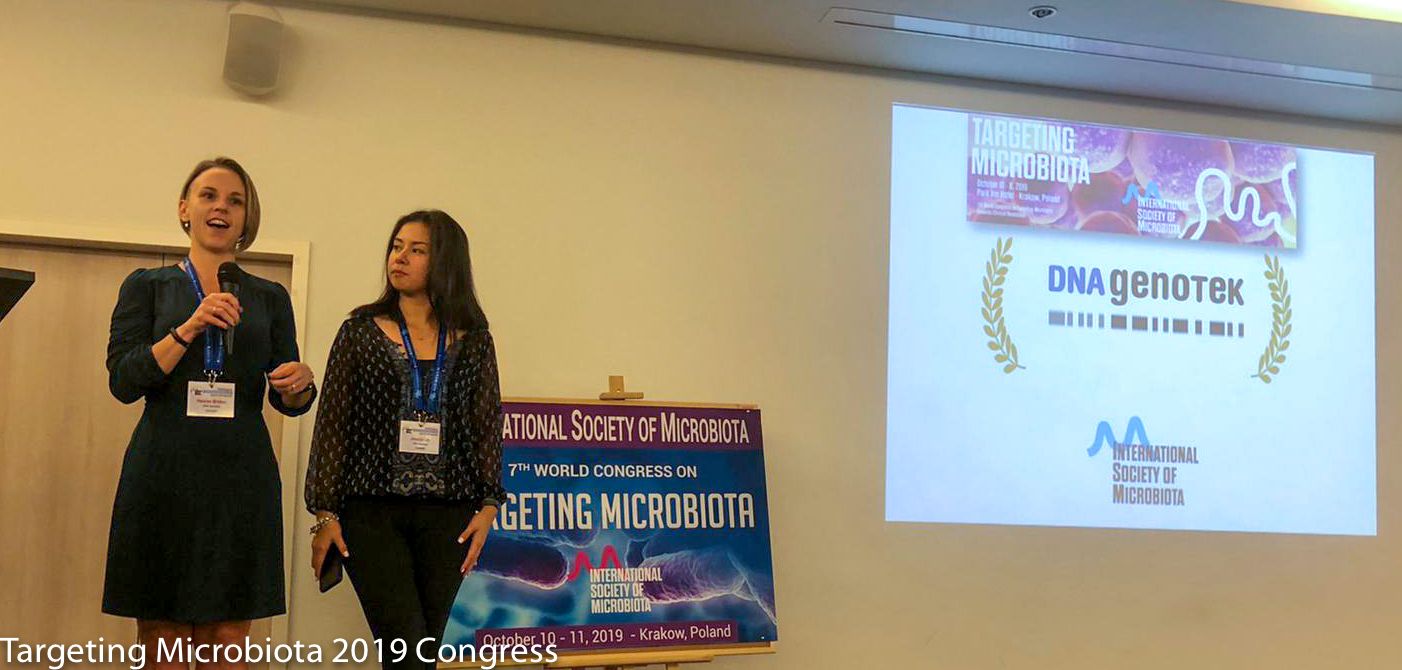
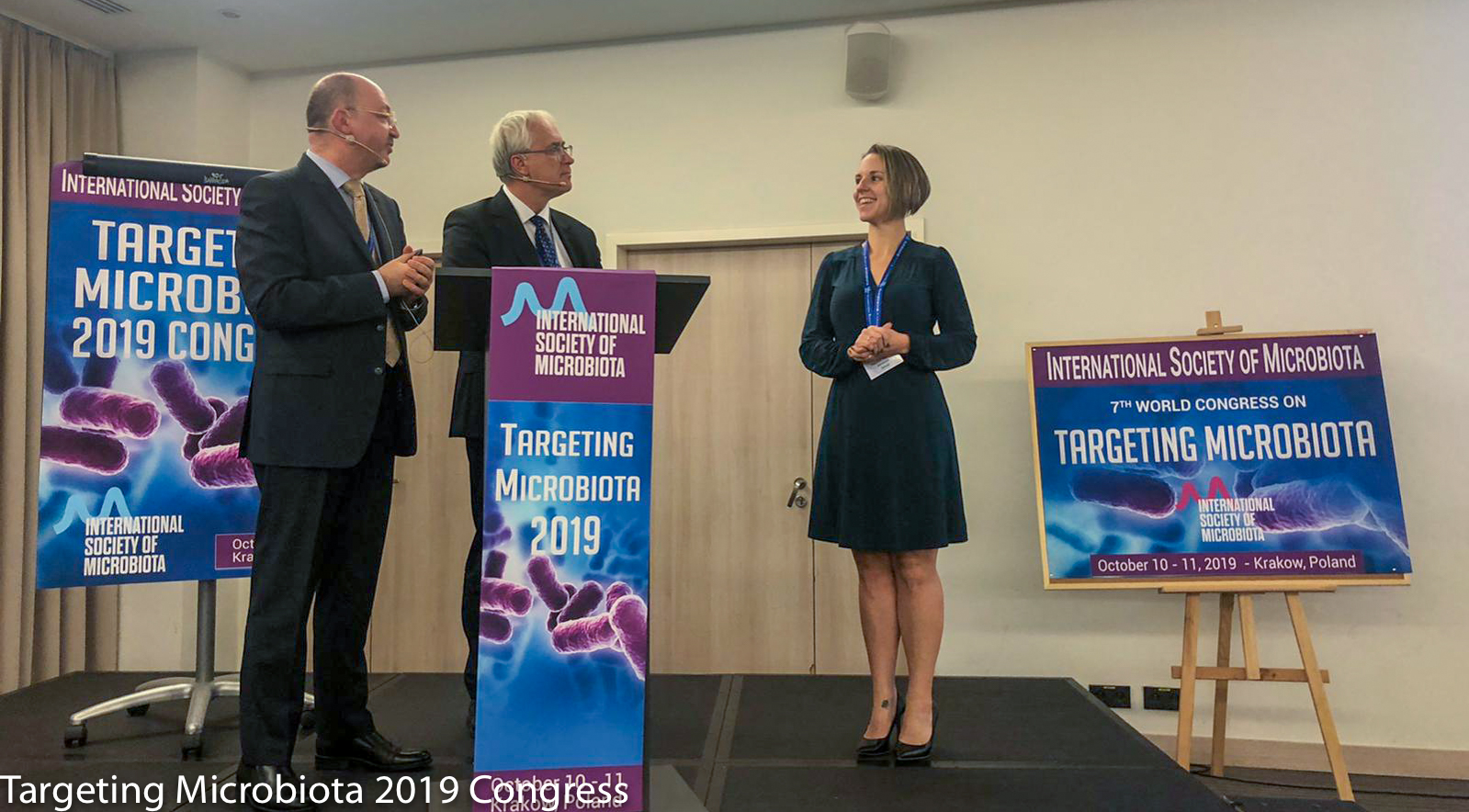
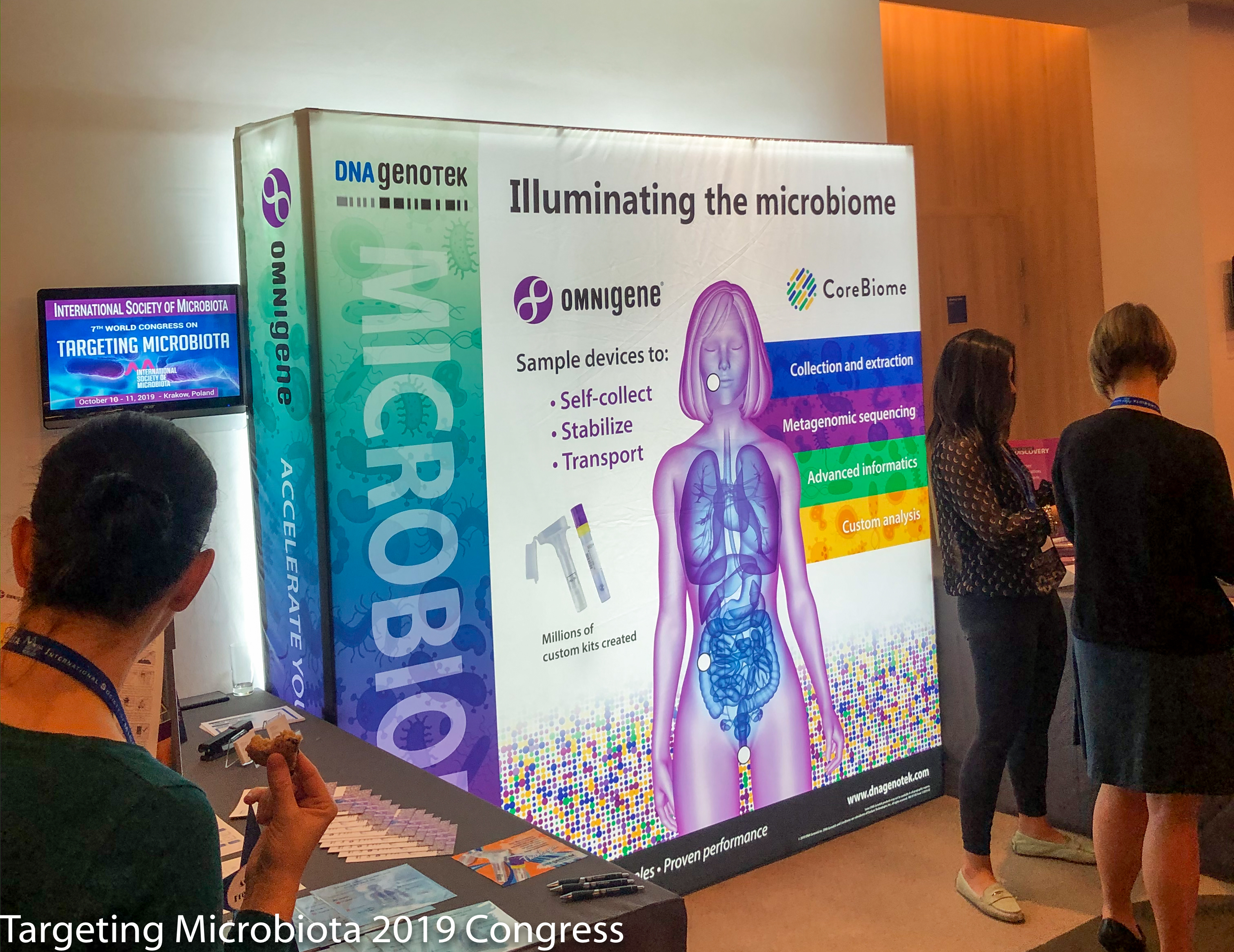
Media center:
Internternational Society of Microbiota
Contact: [email protected]
www.microbiota-site.com
Microbiota and Autism: Recent Advances and Perspectives
![]() Dr. Tatjana Mijatovic from R.E.D. Laboratories, Belgium, one of our sponsor, will join the 7th World congress on Targeting Microbiota 2019 Congress and give a key presentation entitled "Biomedical approach in autism spectrum disorders – the importance of assessing inflammation".
Dr. Tatjana Mijatovic from R.E.D. Laboratories, Belgium, one of our sponsor, will join the 7th World congress on Targeting Microbiota 2019 Congress and give a key presentation entitled "Biomedical approach in autism spectrum disorders – the importance of assessing inflammation".
For more information: www.microbiota-site.com
International Society of Microbiota awarded R.E.D. Laboratories during Targeting Microbiota 2019
International Society of Microbiota (ISM) is honored to discern Industrial Innovation Award to R.E.D. Laboratories during the 7th World Congress on Targeting Microbiota 2019, which was held in Krakow, Poland.
![]()
R.E.D. Laboratories highlighted the high importance of assessing inflammation-related markers in the evaluation of autism spectrum disorders-diagnosed patients.
Testimonial by Dr. Tanja Mijatovic, from R.E.D. Laboratories:
"I really enjoyed the Conference, it was all very well organized and extremely professional. A great conference to attend for anyone in the microbiome fields. Great for gaining insights into unpublished research and clinical findings, and a significant opportunity to network with enthusiastic colleagues. I came back with valuable insights and fully charged with positive emotions. Huge thanks to the organizers. It was amazing to be awarded. Looking forward to be back next year."
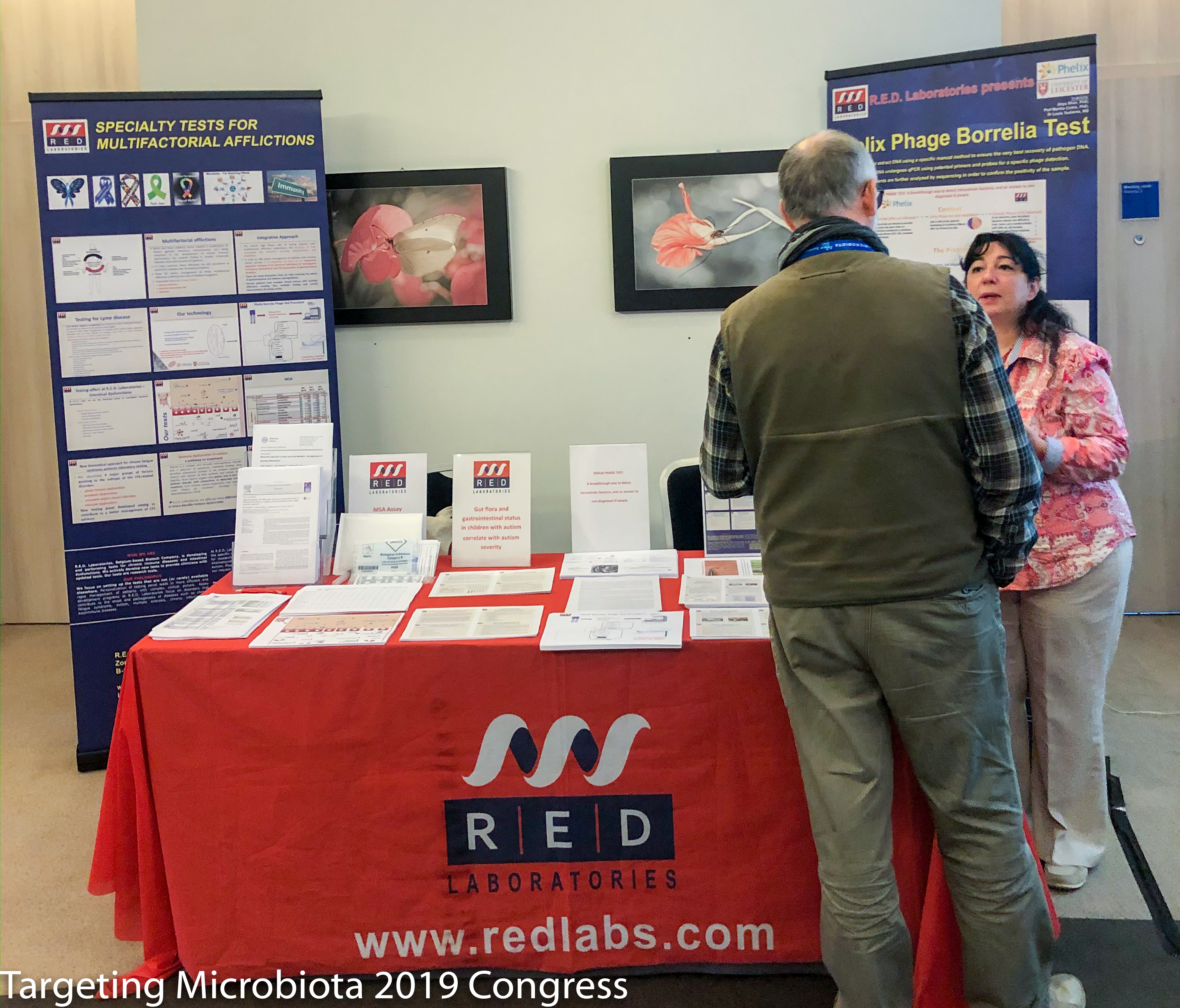
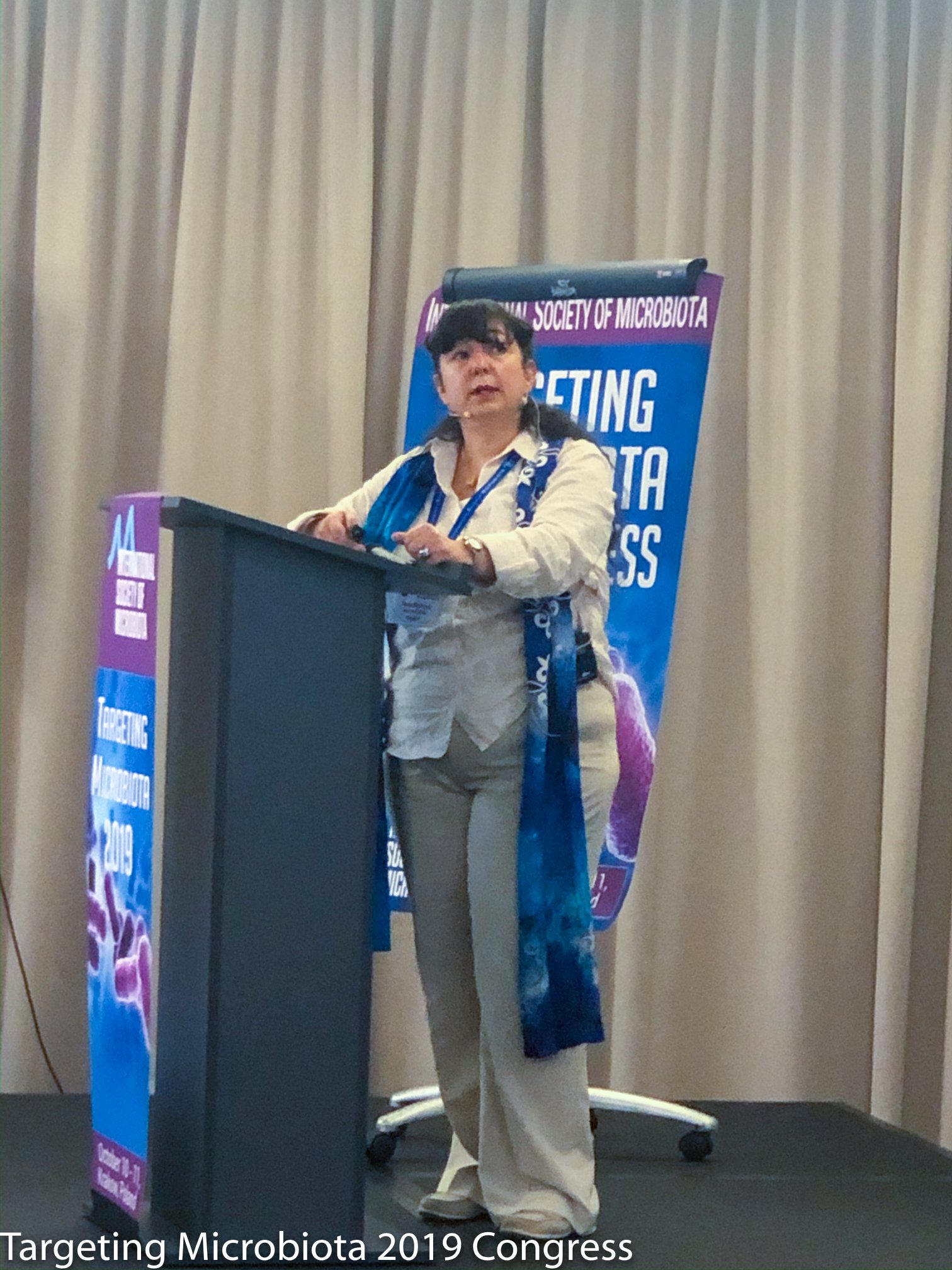
Media center:
International Society of Microbiota
Contact: [email protected]
www.microbiota-site.com
Intergenerational Transfer of the Atopic-Disease Potential from the Murine Maternal Gut Microbiota Grafted with Human Faecalibacterium Prausnitzii Pathobionts
 Prof. Heenam Stanley Kim from Korea University, Korea will join again the Targeting Microbiota 2019 Congress and present his work "Intergenerational Transfer of the Atopic-Disease Potential from the Murine Maternal Gut Microbiota Grafted with Human Faecalibacterium Prausnitzii Pathobionts" during the congress.
Prof. Heenam Stanley Kim from Korea University, Korea will join again the Targeting Microbiota 2019 Congress and present his work "Intergenerational Transfer of the Atopic-Disease Potential from the Murine Maternal Gut Microbiota Grafted with Human Faecalibacterium Prausnitzii Pathobionts" during the congress.
For more information: www.microbiota-site.com
Skin-Bacterial Microbiota Communication: A new element in cutaneous neurogenic inflammation
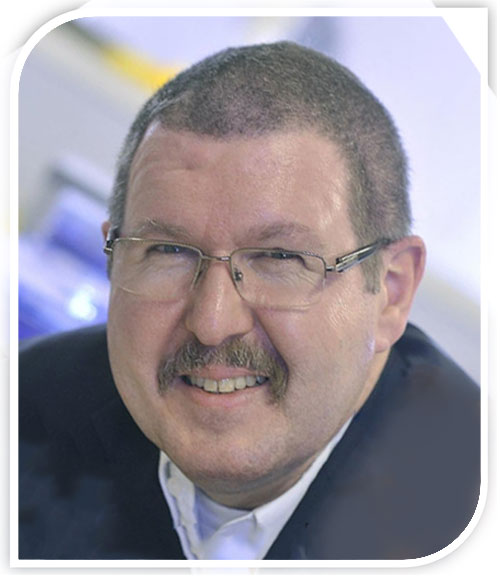 Dr. Marc G.J. Feuilloley from University of Rouen Normandy, France will talk about "Skin-Bacterial Microbiota Communication: A new elment in cutaneous neurogenic inflammation" during the 7th World Congress on Targeting Microbiota scheduled on October 10-11, 2019 at the Park Inn Hotel - Krakow, Poland.
Dr. Marc G.J. Feuilloley from University of Rouen Normandy, France will talk about "Skin-Bacterial Microbiota Communication: A new elment in cutaneous neurogenic inflammation" during the 7th World Congress on Targeting Microbiota scheduled on October 10-11, 2019 at the Park Inn Hotel - Krakow, Poland.
Dr. Feuilloley will talk during Session "Skin microbiota 2019: From basics to applied cosmetics and skin care" and among the speakers:
Dialogue between the skin and the microbiota: The immune system is under control
Chantal Pichon, French National Centre for Scientific Research, France
Intergenerational Transfer of the Atopic-Disease Potential from the Murine Maternal Gut Microbiota Grafted with Human Faecalibacterium Prausnitzii Pathobionts
Heenam Stanley Kim, Korea University, Korea
Intestinal barrier, gut microbiota and psoriasis
Mariusz Sikora, Medical University of Warsaw, Poland
For more information: www.microbiota-site.com
Fecal preservation by freeze-drying: applications and perspectives

Dr. Julie Reygner from Université Paris Descartes - Faculté de Pharmacie, France will join in the Congress and will present her work entitled "Fecal preservation by freeze-drying: applications and perspectives" during the congress.
Short summary: Fecal microbiota transplantation (FMT) has now evolved into an efficient therapeutic for the management of recurrent Clostridium difficile infections (rCDIs) with an efficient cure rate reaching 85-95%. We have previously shown that a freeze-dried formulation allowed to conserve FMT preparation over 12 months improving standardization of the stool preparation procedures, process time and thus facilitating patient access to this treatment. The new goal is to improve of the selection of donors, beyond safety of stool samples, in order to develop a rational selection of FMT donor according to the pathology to be treated.
Dr. Reygner is also Best Shor oral presentation award winner of last year and presented short oral presentation "A new freeze-dried formulation to conserve stools over 12 months for fecal transplantation".
This year, Dr. Reygner join participate as Major speaker and will elobrate more about her study on Fecal preservation, ecal transplantation.
For more information: www.microbiota-site.com
Industrial Innovation Award was discerned to Sethic Innovation Lab during Targeting Microbiota 2019
The Industrial Innovation Award was discerned to Sethic Innovation Lab during Targeting Microbiota 2019 Congress.

Scientific Committee awarded Sethic Innovation Lab for their innovating cosmetic ingredient OPTIMEALTH(R), presented as a potent ingredient to prevents and reduce skin infections, inflammation and related disorders such as atopic dermatitis, rosacea, psoriasis, and acne.
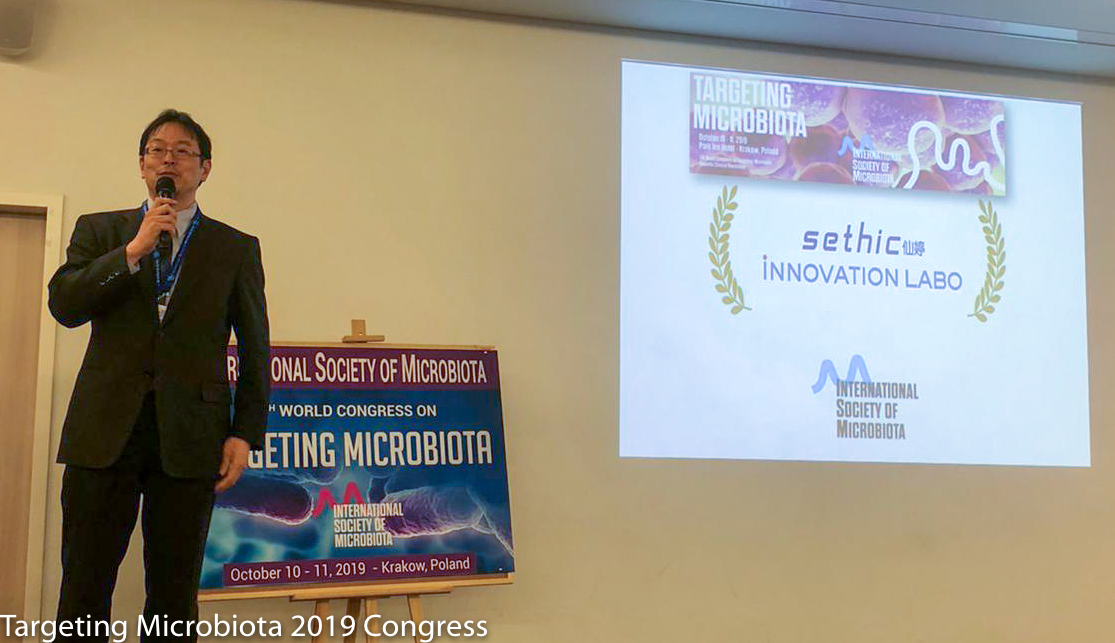
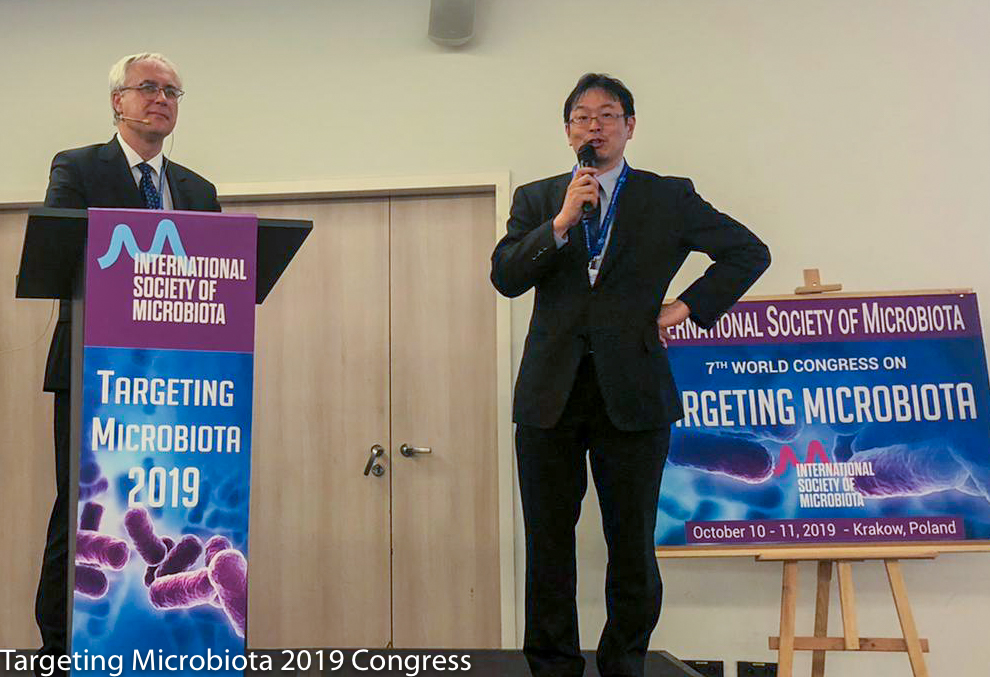
Media center:
International Society of Microbiota
Contact: [email protected]
www.microbiota-site.com
Microbiota Dysbiosis is Associated with HPV-Induced Cervical Carcinogenesis
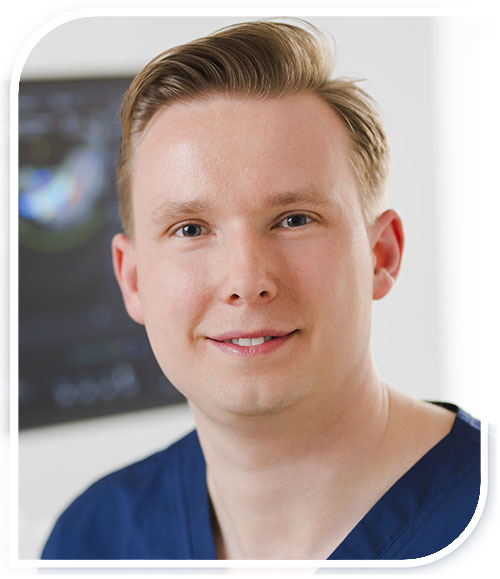 Dr. Wojciech Kwaśniewski will present the findings of the present study on "Microbiota Dysbiosis is Associated with HPV-Induced Cervical Carcinogenesis".
Dr. Wojciech Kwaśniewski will present the findings of the present study on "Microbiota Dysbiosis is Associated with HPV-Induced Cervical Carcinogenesis".
Short summary of the talk: "Over the last decade, it has been indicated that the development and introduction of molecular-based technology has provided novel information regarding the composition of the vaginal‐cervical flora, as well as the abnormal colonization of the genital tract by pathogens. It has been reported that microbe‐induced inflammation can contribute to cervical cancer by stimulating the production of specific cytokines and chemokines, which promote proliferation and/or inhibit apoptosis. Microbiota have been demonstrated to increase, as well as decrease susceptibility to HPV infection. The findings of the present study demonstrated a possible interaction between bacterial flora and HPV infection, as well as an association between this interaction and clinical cervical neoplasia."
For more information: www.microbiota-site.com
Dialogue between the skin and the microbiota: The immune system is under control
 Dr. Chantal Pichon from French National Centre for Scientific Research (CNRS ), France will join the Targeting Microbiota 2019 Congress and present her research work on interaction between Skin and Microbiota during the presentation entitled “Dialogue between the skin and the microbiota: The immune system is under control“.
Dr. Chantal Pichon from French National Centre for Scientific Research (CNRS ), France will join the Targeting Microbiota 2019 Congress and present her research work on interaction between Skin and Microbiota during the presentation entitled “Dialogue between the skin and the microbiota: The immune system is under control“.
For more information: www.microbiota-site.com



